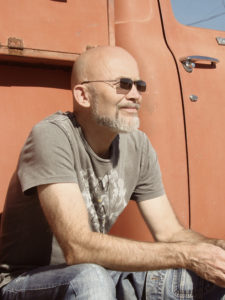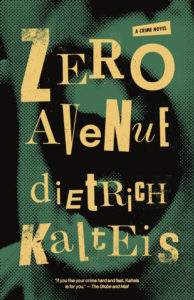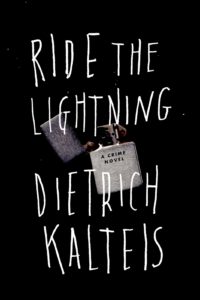
A Conversation with Dietrich Kalteis
Lowestoft Chronicle interview by Nicholas Litchfield (November 2017)

Eight years ago, Dietrich Kalteis was a new fiction writer, contributing short stories to a variety of familiar literary magazines, including the Lowestoft Chronicle. Now, he is fast becoming one of Canada’s top modern crime writers. His debut novel, Ride the Lightning, won an Independent Publishers Award and was hailed as one of the best Vancouver crime novels, and he has since gone on to pen four more gritty, noteworthy crime novels that have had people comparing him to the likes of Elmore Leonard. Publishers Weekly have called his books fast-moving, high-octane page-turners full of well-drawn characters and authentic-sounding dialogue, and the National Post has praised him for his plot structure and breezy style. As The Globe and Mail puts it, when discussing his gloriously hard and fast style: “If you like hard sex, tough talk, motorcycles, guns and boys with toys, this is your meat.”
In an exclusive interview with Lowestoft Chronicle, Kalteis talks about his novels, his literary influences, and some of his many future projects.

Lowestoft Chronicle (LC): Your latest crime novel, Zero Avenue, is getting a lot of much deserved attention, with positive reviews from readers and the likes of Publishers Weekly and Kirkus Reviews. Did you get a sense while writing it that it would prove popular?
Dietrich Kalteis (DK): I had no idea how the book would be received while I was writing it. I don’t think a story would work if I tried to plot it out based on what I thought would be a hit. I write what appeals to me, the kind of story that I’d like to read myself. My stories usually stem from something I’ve heard, read, experienced or dreamed up. Then I think, what if this happens, and I give it a twist. Starting with a single scene, I drop in the type of characters I’d like to have handle it, and I see where it goes, letting the story unfold as the scenes and characters develop.
LC: Some years ago, you mentioned reading an article in the National Post about the billion-dollar cannabis industry in British Columbia. And, apparently, you knew some guys who tried to rob a pot field and had rock salt shot at them. Does Zero Avenue stem from those two stories?
DK: I chose the punk scene of the late seventies for the setting because it was so raw and angry, and Vancouver was such a polite, sleepy backwater town back then, so there was this natural tension. I always loved that story of the two guys getting rock salt shot at them, and I wanted to include it. There was no satellite imagery or Google Earth back then, and a pot field could stay hidden inside a cornfield.
That article about the billion-dollar cannabis industry sparked my first novel Ride the Lightning. It fascinated me how many grow-ops were estimated to be operating in secret, making pot one of the provinces leading cash crops, and all tax free. I just had to spin a story around it.
LC: The early punk rock scene in British Columbia plays heavily into the narrative. What sort of research did you do into the punk era and drug trafficking in general?
DK: I was living in Toronto during those days, and I loved the punk scene. I talked to people who lived in Vancouver during those times. And there were some excellent books by John Armstrong (Buck Cherry of the Modernettes) and Joe Keithley (Joey Shithead of D.O.A), among others that made excellent reference. There was also a great documentary called Bloodied but Unbowed by Susanne Tabata, which helped with some of the details. And there was no shortage of archived news about smugglers and border jumpers on the drug trafficking front.
LC: Frankie del Rey, your kick-ass, punk rock protagonist, is a particularly striking character, not least because she’s a tough, fist-swinging female caught up in a brutal, masculine world. How challenging was it writing from the female perspective while placing her in violent and vulnerable situations? And was it always your intention to have her be the main lead, rather than the club owner Johnny Falco?
DK: I wasn’t sure at first if I could write a female lead character, but as Frankie’s character took shape, I felt it was working, and she just started taking center stage. I like that both her and Johnny Falco have their own agendas, are unwitting and have to step up and face what comes at them.
LC: In 2014, you said: “When I’m writing, I always picture my stories like movie scenes and my characters like actors.” It’s often noted that there’s a cinematic quality to your books. In fact, your screenplay, Between Jobs, was a finalist in the 2003 Los Angeles Screenplay Festival. Did you ever consider pursuing a career in screenwriting?
DK: I did pen a few screenplays some years ago, but writing novels allows more expression in the narrative, and time to build on details, characters, plot points, back stories and resolution. While I do visualize chapters like scenes in a film, and I like to let the characters tell much of the story through dialog, which works in either form, writing novels and screenplays are quite different. Although I’ve never seen myself writing screenplays as a career, it would be awesome to have one of my novels adapted and watch it come to life on the screen.
LC: In terms of the stories you read and write, you favor crime fiction over other literary genres. Was this always the case? Have you experimented with other genres and styles?
DK: When I started writing short stories I tried different genres to find where I fit. Once I found my voice, crime fiction just seemed to be where I belonged. Some of my stories border on historical fiction, but there’s still a crime element. And while I read a lot of crime fiction, I also read outside the genre. It’s about reading a great voice, and I’ll read and reread just about anything by the likes of Hunter S. Thompson, Charles Bukowski, Patti Smith, Jack Kerouac, John Steinbeck, and J.D. Salinger.
LC: You’ve singled out authors like Elmore Leonard, George V. Higgins, James Crumley, Robert B. Parker, and Charles Willeford as writing novels you love. Are these the writers that have influenced you the most?
DK: They all had strong voices and wrote the kind of stories that I like. All were master storytellers who were great at writing dialog and adding levity to the tension. I could add a few more names to the list, like Don Winslow, Carl Hiaasen and James Ellroy, but writers of this caliber sure influence and inspire me to write at my personal best.

LC: You’ve had roughly fifty short stories published in literary magazines around the world. Did you make a conscious effort to switch to novel writing, or was this change because you felt Ride the Lightning merited more character and subplot development and would work better if expanded into novel form?
DK: At first, I experimented with different genres and approaches when I was writing primarily short stories, feeling I wasn’t ready to tackle anything novel-length. One of the short stories I wrote was about an insurance investigator who gets into a relationship with a married woman who he’s been taking pictures of. She tries to cheat the insurance company, but as sparks fly between them, his allegiance takes a shift. I really liked that piece and wanted to do more with it. I took the characters along with some ideas, which came after reading that news story about the billion-dollar pot industry, and it became a jumping-off point for Ride the Lightning.
LC: What is your writing process? Does the story come first or the character? I’ve heard you say that you don’t work from an outline. Is that always the case?
DK: As the characters develop during a first draft, evolving from scene to scene, I let their nature dictate the course they’re going to take, and I tell it from the characters point of view. The story just takes shape from an initial scene. I never outline a story; I just see where it goes. Ideas and situations come along that work into the story as I’m writing, and I think these turn out better than anything I could come up with if I sat down and outlined the story beforehand. Once I’ve got a first draft, I create a timeline and make sure everything makes sense and flows in a proper sequence. I also keep character sheets that contain information about each of them and help me keep facts straight.
LC: Given that you have five published novels under your belt, the next due for publication in June, and the first draft of another novel written out in longhand, has writing a novel become a smooth process for you? Is the eight months it took to write Zero Avenue the standard length of time it takes you to write a novel?
DK: Over the years I’ve found what works best for me, which includes switching off the phone and playing music through headphones to cut out any white noise. And I try to keep away from social media while I’m working. Also, my energy for writing is best when I start early in the morning, usually around five, then I write until noon. There are no fast rules about it, but I try to have one novel finished every year. Sometimes that comes easy, and other times a story needs extra work and time.
LC: ECW Press, a major independent book publisher in Canada, has published all of your novels. How did you get involved with this publisher? Did you approach other publishers when trying to place that first manuscript?
DK: I sent Ride the Lightning to a couple of agents and directly to ECW. When Jack David got back to me a couple of weeks later and proposed a deal, I was thrilled. It was the right move for me, and it’s been great working with the folks at ECW over the years.
LC: You have work forthcoming in Vancouver Noir, a new anthology in Akashic Books’ Noir Series. Will this be a new story? Will it feature any familiar characters—Frankie, perhaps?
DK: It’s a fresh story with new characters. The story’s called Bottom Dollar, and it’s about a second-story man who tries to rip off a gangster who keeps a lot of cash hidden in his house. Bent on revenge from a previous encounter, our burglar breaks in late one night and runs into the gangster’s disgruntled girlfriend pointing a pistol at him. It looks like he’s screwed, until she says: “Take me with you.”
LC: Your next novel, titled Poughkeepsie Shuffle, due for release in 2018, is a gangland tale of gun smuggling in Toronto in the mid-eighties. What made you set it in the 1980s and did the story necessitate a switch from west to eastern Canada?
DK: I grew up in Toronto back when there was Sam the Record Man on Yonge Street, the Brunswick House, Honest Ed’s, and Eaton’s at the Eaton’s Center. A lot of the story takes place in an area called the Junction, and I wanted to capture the urban landscape the way I remembered it. After I read a news article about a gun-smuggling ring operating from New York state, smuggling guns up into Canada, the story just took shape from there.
LC: “I always listen to music while I write, and I play what goes with what I’m working on,” you once said. Is Poughkeepsie Shuffle set to a hip-hop or glam metal beat? You’re currently working on a historical novel set in Kansas in the Dirty Thirties. Are you listening to folk music or swing jazz?
DK: The music has to suit the vibe of what I’m writing. For Zero Avenue, I listened to a lot of West Coast punk, which went with the general intensity of the story. For Poughkeepsie Shuffle it was old-school rock, and for my dustbowl story I’ve been leaning to folk, bluegrass and early blues, and yes, some swing jazz. There’s no golden rule to it, I just put on what I feel like, but I’ve always got something playing while I’m writing.
About the Author
Dietrich Kalteis is the award-winning author of Ride the Lightning, The Deadbeat Club, Triggerfish, House of Blazes and Zero Avenue. Nearly fifty of his short stories have been published internationally, and he lives with his family on Canada’s west coast.
About the Interviewer
Nicholas Litchfield is the founding editor of Lowestoft Chronicle. He is a regular book reviewer for the Colorado Review and his book reviews for the Lancashire Post are syndicated to 25 newspapers across the UK.
